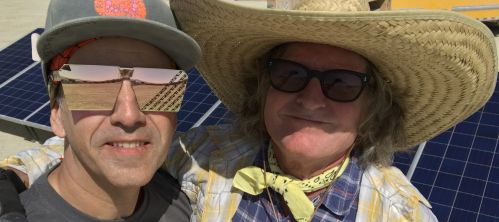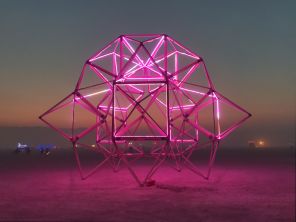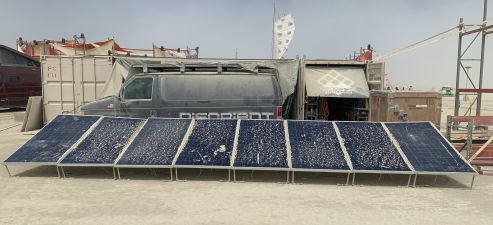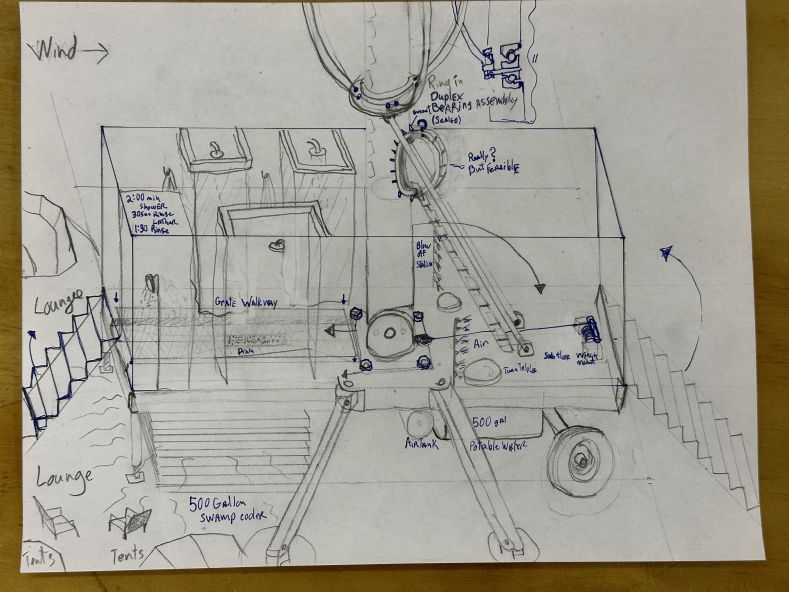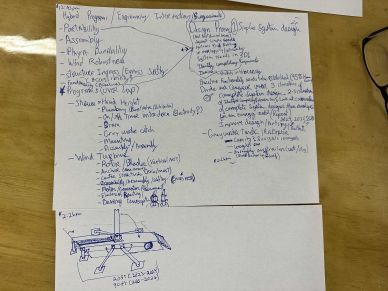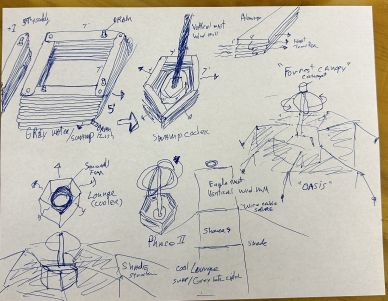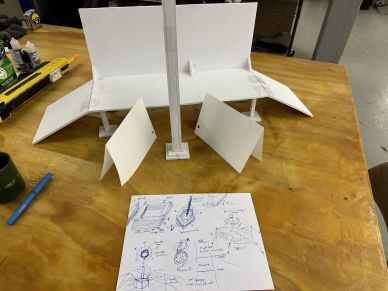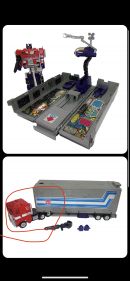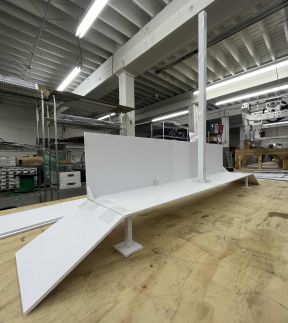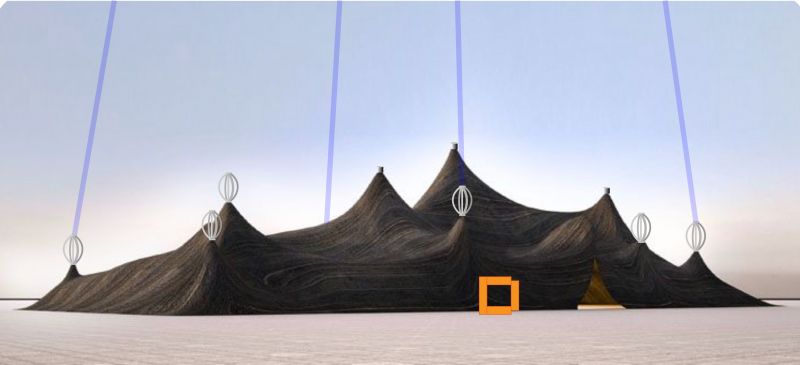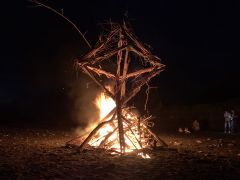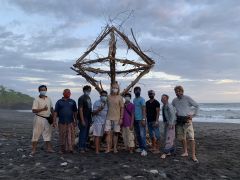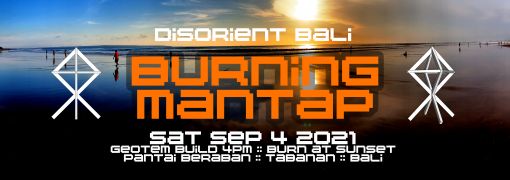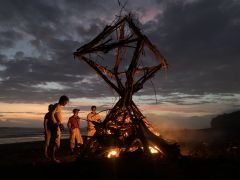Difference between revisions of "Sustainability Efforts"
| Line 48: | Line 48: | ||
Compression can be achieved with a simple car [https://en.wikipedia.org/wiki/Jack_(device) jack]. The compression mold is a relatively affordable one-time investment. Using a 2 ton press will work ok. A 10 ton press will probably give better result. What happens if we use a 4000 ton press to create our plastic bricks?<BR> | Compression can be achieved with a simple car [https://en.wikipedia.org/wiki/Jack_(device) jack]. The compression mold is a relatively affordable one-time investment. Using a 2 ton press will work ok. A 10 ton press will probably give better result. What happens if we use a 4000 ton press to create our plastic bricks?<BR> | ||
Pressure equals heat. Solar heat can be used | Pressure equals heat. Solar heat can be used to soften/melt the plastic chips to help the compressing process. For instance we could leverage the heat stored by a large metal object such as a shipping container exposed to the sun or create a solar oven to melt the shreds of plastic into metal molds.<BR> | ||
====Brick Compressor==== | ====Brick Compressor==== | ||
Revision as of 00:49, 16 January 2024
Energy
Goal
Disorient camp at Burning Man is aiming to use 95% renewable energy by 2027.
D23 Power Rethink
Lead: Ice Cream
Some thoughts to start D23 power rethink
Solar
We have been working on solar solutions for Geodesic Temple with our friends at Black Rock Labs since 2017.
CoSign "D", part of D22's frontage, 100% powered by solar array provided by Black Rock Labs.
Wind
See TSSHP below.
On-Site Mixed Plastics Recycling
Cell Lead: The Eye
After all these years, words and good intents, we are still in what feels like the Stone Age of plastic recycling. A long-term solution demands that we break the table-to-landfill cycle and weave plastic recycling deep into our lives by turning it into a practice, a ritual.
Here's our plan
1. Keep it simple.
1.1. Use what's readily available. The chosen recycling process should not require water, chemicals, additives, adhesives, or fillers. Ultimately, it should not require electricity either but we will probably use some electricity at the beginning to jumpstart the process.
1.2. Minimal pre-processing. We need to find ways to make recycling entertaining and intellectually rewarding, in other words, we need to amplify its feel-good factor and make it viral. Developing a recycling practice should be as easy as possible with only minimal sorting, cleaning or pre-processing. There are arguments for pre-processing but at our stage of recycling (remember, we're in the Stone Age) we just need to keep it simple get started. We can get fancy later.
2. On-site, on-scale and self-reliant. The transportation of discarded plastics accounts for a large part of plastic-related pollution. Ironically, current recycling strategies involve polluting the air further by shipping huge amounts of trash around the planet. Following our DIY ethos, plastics recycled by Disorient is not moved to another facility across the planet or even across the playa. It is reconfigured on site with a solution tailored to our problem.
3. Distributed. To have a better chance to reduce our contribution to the landfill, plastic recycling needs to become easy, hyper-local and sexy. Based on point #2 above, the solution should be open-source and easily replicable by other individuals/camps/communities. The current centralized industrial solutions need to be balanced and possibly replaced with decentralized individual solutions. We need to address the problem where it happens: in everyone's backyard. Small solutions distributed widely.
4. Start with Disorient. In recent years Disorient camp at Burning Man has welcomed about 230 campers per year. Our plan is to create a recycling system that will be able to address the mixed-plastics recycling needs of all our campers.
Shredding
We use a plastic shredder like this one (Tokopedia, Indonesia) or that one (Amazon, USA) to turn mixed plastics into little chips and a compressor with a mold which compresses the plastic chips into bricks similar to this one or that one to create bricks following this example.
The shredding part of the process requires more investment since the shredder itself is a more expensive piece of equipment starting around 1,000 USD in Asia and around 2,000 USD including shipping in the US. Examples: Lanrryy Machinery, Franklin Miller, Vecoplan
We probably want to start with a shredder. Granulator vs shredder: what is the difference?
Plastic Shredder
Example of plastic shredder at the Museum of Space Available, Bali, Indonesia, 2022:
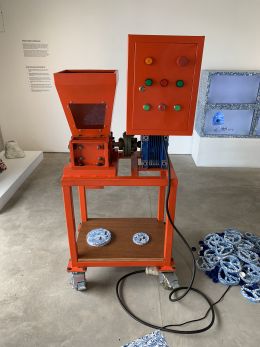
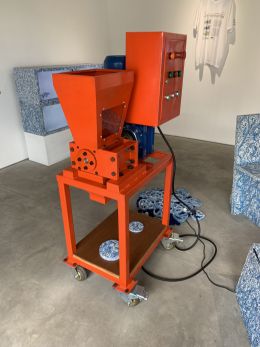
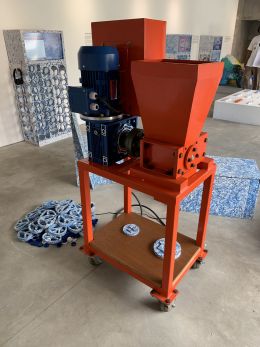
Compressing
Compression can be achieved with a simple car jack. The compression mold is a relatively affordable one-time investment. Using a 2 ton press will work ok. A 10 ton press will probably give better result. What happens if we use a 4000 ton press to create our plastic bricks?
Pressure equals heat. Solar heat can be used to soften/melt the plastic chips to help the compressing process. For instance we could leverage the heat stored by a large metal object such as a shipping container exposed to the sun or create a solar oven to melt the shreds of plastic into metal molds.
Brick Compressor
Examples of brick compressor and molds
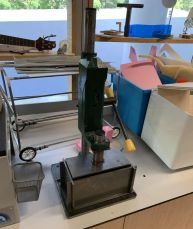
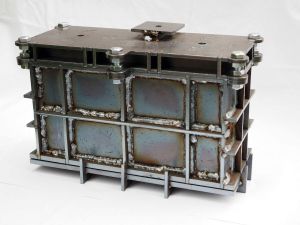
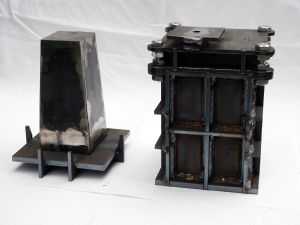
Human-powered recycling set
Example of human-powered plastic shredder and brick compressor at Monsieur Spoon in Pererenan, Bali, Indonesia, August 2020:
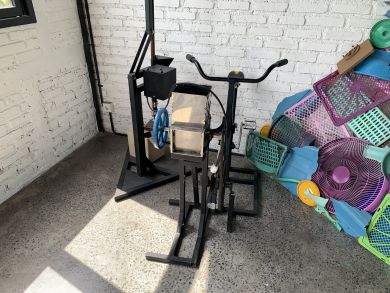
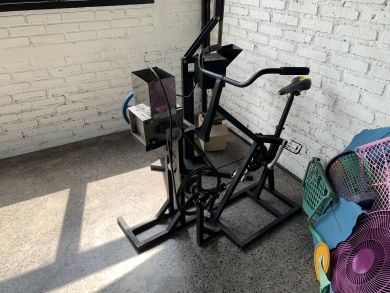
Although not our approach, here's a video of a radical experiment of melting mixed plastics together.
What new plastic objects do we need?
Making objects out of plastic trash is neat but the question at the end of the recycling line is this: what kind of new plastic objects do we need? What objects are best positioned to gain the most from being made out of plastic? How do we avoid recycling the problem along with the plastic?
Disorient's goal is not only to become self-reliant when it comes to plastic recycling by recycling on-site (immediacy) but also to start using the resulting plastic bricks (and possibly other objects depending on the molds used during compression) as a component of our art installations. Creating 3D printing filaments is a possible solution but requires specific types of plastics which means that we would need to add pre-processing steps to our plastic recycling. This is something that we are trying to avoid at the beginning.
It's somewhat comforting to know that when our recycled plastic objects become obsolete, we can throw them back into the shredder for another cycle.
None of this is new. What's new is to actually make it happen.
Transformative Shower System Hybrid Program (TSSHP)
Cell Lead: Proto
Shared community space to ascend and renew. Perspective and Perseverance are two assets of playa life. With disorient’s founder’s guidance a short/medium/longterm evolving program to reenergize our community will spearhead Burning mans ___? 2027 net zero goal.
Like nature, the parts of the biota collaborate to support the overall ecosystem. We plan to do the same. Wind, Water, Gravity, and thermal exchanges are the toys of physics we persevere or enjoy. We play/engineer/strive for balance. We purpose an experience diverse spatially. A shower system to accommodate 4-5 privately, semi-privately and for those freed, a pinnacle perspective with only gravity accountable. A cool lounge pre and post cleanse lit to illuminate your imagination. The top of the structure will have staircase to a crow’s nest where the last shower will have a view of the camp/playa. Integrated into the staircase will be the infrastructure for a vertical axis windmill generating XX Kws. As a complete unit this lighthouse for net 0 power generation can be replicated on all four (5-6 units maybe) corners of Disorient aspiring to us achieved to net zero.
Top priority: no one get seriously hurt or dies.
2023: A base structure of a shower(s) / eagle’s nest / greywater swamp cooler lounge.
2024: Design with intention the base structural will facilitate the vertical Windmill prototype. Recordation from diesel generators total camp usage from alpha, burn, Disengage.
2025: Refine/optimize windmill prototype for more KWs and maybe make a better turbine design.
2026: Reproduce 2-4
2027: Sell units to other camps. Achieve net Zero
Disorient Unplugged
Further exploring sustainable options, Disorient Unplugged is a new type of Disorient event that uses no electricity on site. Removing electricity from our practice is a challenge that forces us to rethink fundamental aspects of Disorient.
Our first Disorient Unplugged event was Disorient presents: BURNING MANTAP in Bali in 2021.
References
https://www.wired.com/story/burning-man-climate-death-spiral/ Alden Wicker, 20230404
